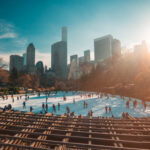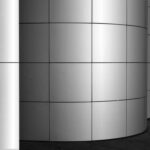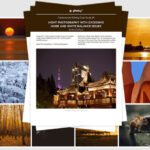Abstract imagery can be one of the most powerful forms of visual communication. While traditional photography is consumed with the idea of details, exposure, white balance, and the rules of photography, abstract photography depends more on forms, colors, and shapes to communicate ideas. True, abstract photography can often be misunderstood, but it can also make for breathtaking compositions that communicate much more while disguised in a cloak of minimalism.
In this video tutorial, photographer Bryan Peterson describes how to create abstract images using everyday locations. His quest brings him at Chicago’s Bean. Also known as Cloud Gate, it is one of the most photographed sculptures in the city:
Peterson shows how the extremely shiny surface of The Bean and the fact that it is curvilinear provides some interesting opportunities to create abstract photos. In one of these photos, Peterson stands right underneath the sculpture while aiming his camera, mounted with a wide angle lens, at the buildings in the background.

A reflection on the curved surface of The Bean creates an amazing perspective.
The curved surface of the sculpture distorts the reflection of the buildings, and where one of the buildings touches its own reflections, an interesting point of convergence is created. Incidentally that point almost satisfies the rule of thirds. A thin line that separates the reflection from the actual scene runs diagonally across the frame, which again adds an interesting aspect to the image.
Peterson used the classic Sunny 16 rule of exposure for the above shot. F/16, ISO 100, and a shutter speed of 1/100 of a second.
Another interesting series of photos that Peterson took are of “Chicago’s scary faces.” These are nothing but reflections on The Bean’s underbelly, which look like faces.

Chicago’s Scary Faces
Peterson says he took these images using a Nikkor 17-35mm lens set at about 20mm. The information with this video, however, states that the lens used was a Nikkor 24-85mm f/2.8 – 4 IF AF-D. Notwithstanding the confusion, the images are pretty amazing! The settings that he used were manual focus, set at one meter, and an aperture of f/22. Together that gave him a maximum depth of field of 11 inches to infinity. Peterson recommends you play around with your white balance setting in such situations.
“So, one of the points I want to make about those faces we just saw. Consider also the opportunity, in a situation like that, to play with your white balance a little bit. Take a look at those same faces now with their white balance in both tungsten or in fluorescent.”

Tweaking the white balance makes a more compelling image.
So, next time you find yourself in Chicago, resist the temptation to take that clichéd selfie with The Bean. Try experimenting with abstract compositions.
Like This Article?
Don't Miss The Next One!
Join over 100,000 photographers of all experience levels who receive our free photography tips and articles to stay current:






Leave a Reply